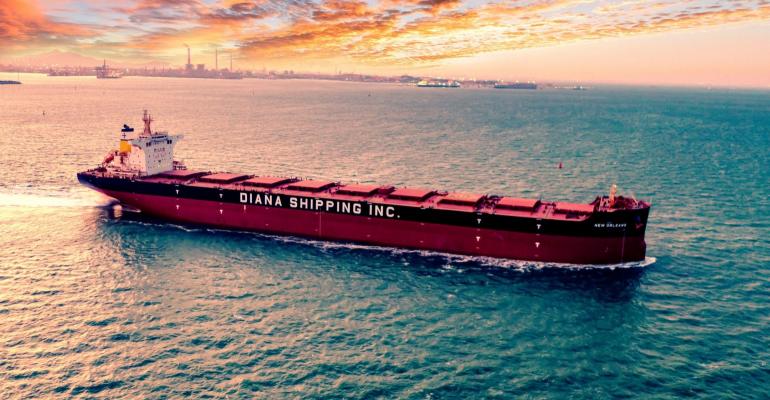Decarbonisation remains the hot topic and IMO’s carbon dioxide reduction targets were criticised by speakers who said they were hastily set and that they raise obstacles to shipping and thus global trade at last week’s Greener Shipping Summit in Greece.
Diana Shipping Inc director and Hellenic Marine Environment Protection Association (Helmepa) president, Semiramis Paliou told the online conference the industry feels decisions have been taken for it hastily, with a short timeline, while research has not been adequately preformed, and the “shipowner, once again, is required to bear the expenses involved’ when all stakeholders including charterers shipyards, equipment makers and financial institutions need to be involved.
The boss of the NYSE-listed Diana, pointed out in her keynote address to the summit that sustainability broadly consists of three key dimensions: the environmental, the economic, and the social.
Of the three, Paliou noted the shipping industry is presently mainly focusing on the environmental which is being widely addressed under the broad definition of decarbonisation, and as it moves in this direction “the shipping industry is faced with multiple hurdles” in meeting IMO requirements.
She said there are concerns to be addressed, such as whether new fuels introduce expensive ships, increased operating expenses, more complex systems, new manning skills and possible new hazards. She said it is paramount the path be treated with caution and collectively by all shipping stakeholders.
“Collaboration across the shipping industry is the way to move forward,” she advocated.
The summit was organised by Newsfront / Naftiliaki under the auspices of Greece's maritime technical body, the Greek Marine Technical Managers Association, MARTECMA,
Many lessons have been learned from the application of 2020 environmental regulations the summit was told though the industry’s first major milestone, the 2020 sulphur cap, was implemented more smoothly than expected, said Bill Stamatopoulos, of Bureau VeriFuel.
Fotis Belexis, technical director of Star Bulk Carriers felt scrubbers generally met expectations, while BWT systems are continually being developed said Stelios Kyriacou of ERMA first ESK Engineering Solutions. Digitalisation continues to have a big impact on the way ships are being managed and this will bring changes in the general thinking of the industry, said RINA’s Alessandro Pescetto.
Much discussion took place on how EEXI and CII and it soon became apparent when it comes to the operation of ships the indexes are a capex issue rather than a technical one.
When looking at EEXI and how it affects shipowners and a ship’s lifetime panelists agreed the EEXI is an index with the same logic as the EEDI but, as John Kokarakis, Bureau Veritas, pointed out the main problem is lack of data for pre-EEDI vessels especially regarding the power-speed curves at scantling draft.
Dimitrios Fafalios, Intercargo’s chairman spoke of the danger of a two-level market, noting fast bigger ships are sought by charterers for long-haul trades, while charterers not do really pay attention to weather conditions nor the time spent loading and unloading, which especially impacts small ships. Time charterers will have to manage the speed of vessels carefully to comply.
It was agreed compliance with EEXI has to be viewed in combination with CII and more importantly assessed in a life cycle assessment mode with consideration of well to wake emissions. There was optimism a second round of EEXI in 2026 will not be necessary given the lower speeds and the benefit of having fleet renewals as well as use of more eco-friendly alternative fuels. When it comes to CII it was noted IMO and the EU must bring charterers into the battle against emissions.
Panos Zachariadis a Greek representative at IMO, wondered just how much CII will impact a company’s legal obligations.
Copyright © 2024. All rights reserved. Seatrade, a trading name of Informa Markets (UK) Limited.
Add Seatrade Maritime News to your Google News feed.  |

